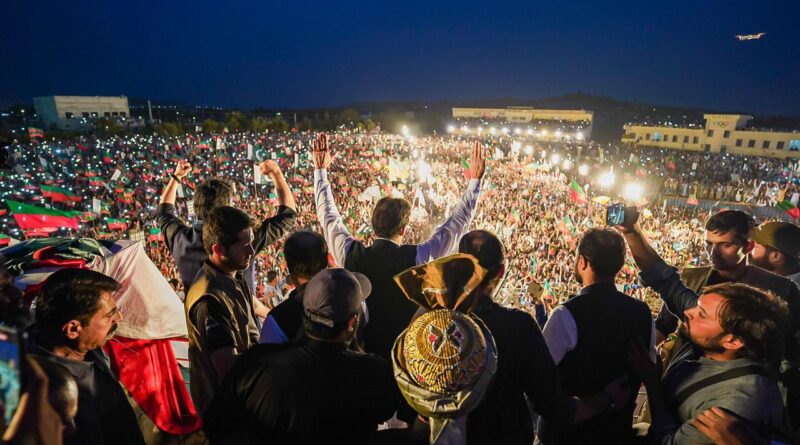
Former prime minister says he will meet with his chief ministers and parliamentary party to announce the timing of the exit
By Ghulam Haider
Pakistan’s former prime minister Imran Khan said Saturday that his party would be quitting the regional legislature assemblies in the latest twist of political turmoil and economic instability in the country.
Khan, chairman of Pakistan Tehrik-e-Insaf (PTI), made this political ploy public while addressing a gathering of his cheering supporters near Rawalpindi Garrison in his first appearance after being wounded in an assassination attempt at a public rally earlier this month in Punjab — the most populous province ruled by a PTI-led coalition.
Since his ouster in the wake of a parliamentary no-confidence vote in the national assembly in April this year, Khan is now in opposition, and has been on the roads demanding early elections, claiming his ouster was illegal and orchestrated by the United States and facilitated locally by the establishment and the current prime minister Shahbaz Sharif.
The populist 70-year-old former prime minister has been leading big protest rallies across the country to push his successor, Prime Minister Shehbaz Sharif, into holding snap general elections.
“We wouldn’t be [a] part of this system anymore. We have decided to quit all the assemblies and get out of this corrupt system,” Khan told the cheering crowd gathered. He said he would soon hold a meeting of senior party leaders to decide on a timetable for all PTI lawmakers to resign en-masse from regional legislative assemblies.
The maverick politician spoke for more than an hour, including references to the Sufi mystic Rumi, the fall of the Soviet Union, and the seventh-century Shiite leader Imam Hussain.
No march to Islamabad
Imran Khan had vowed to march on the Pakistani capital with his supporters but announced Saturday he had decided to end that campaign after he stepped down from personally leading the convoy in the wake of gun attack. “We could have created a situation like Sri Lanka. I have decided against marching on Islamabad because I don’t want destruction and chaos in the country,” he said.
Toward the end of his speech, he did a U-turn on his demand for snap elections, saying his party would win the polls scheduled for nine months’ time. He also said he would no longer march on the capital.
“They [government] cannot deal with a march in Islamabad, they can call as many police as they want, but they cannot stop the hundreds of thousands from entering Islamabad,” said Khan. “We could have created a situation like Sri Lanka. I have decided against marching on Islamabad because I don’t want there to be anarchy in the country. I don’t want to cause any harm to this country.”
Khan launched a protest march late last month from the eastern city of Lahore toward Islamabad as part of his campaign for early polls, but stepped down from personally leading the convoy after he was wounded.
The cricket-star-turned-politician Khan blames Sharif, Interior Minister Rana Sanaullah and a senior general of the country’s spy agency, the Inter-Services Intelligence (ISI), accusing them of being behind the November 3 shooting that left a passerby dead and wounded at least a dozen others.
The government has denied allegations that it had anything to do with the attack.
Leaving legislatures
The PTI controls two of Pakistan’s four provinces including Punjab and Khyber Pakhtunkhwa. It also governs and commands a majority in the legislative assemblies of what is known as the Gilgit-Baltistan and the Pakistan-administered part of Kashmir. Archrival India administers two-thirds of the disputed Himalayan region.
His party resigned from the national assembly en-masse in April ahead of a vote to elect a new prime minister, although most of the resignations have yet to be accepted. Khan’s stronghold is in the northwest province of Khyber Pakhtunkhwa, and leaving the Punjab assembly would hand power to his rivals.
Khan rejects the April no-confidence vote as an unlawful action, blaming Sharif and Pakistan’s outgoing military chief General Qamar Javed Bajwa for colluding with the United States to topple his government.
Islamabad and Washington deny allegations
Khan’s party resigned from the National Assembly, the lower house of the national parliament, after he lost the vote and Sharif replaced him as the new prime minister.
The Pakistani government has also rejected his demand for early elections, saying the next polls in the country will be held as scheduled in October 2023.
Foreign Minister Bilawal Bhutto Zardari described Khan’s protest rally Saturday as a “face-saving flop show.” He said on Twitter: “Unable to pull revolution crowds, failed at undermining appointments of new chiefs, frustrated, resorts to resignation drama.”
Sharif appointed General Asim Munir as the new army chief. He is to take charge from Bajwa on Tuesday. Khan has also accused the outgoing army chief Gen Bajwa of playing a role in his ouster. Bajwa denies the allegation.
The government alleges Khan organized Saturday’s protest to try to block Munir’s appointment.
The rally Saturday night came days after the appointment of a new army chief, Asim Munir, who ran the country’s spy agency during Khan’s term in office but was fired without an explanation from the then-premier.
Military influence
The military wields outsized influence over the national politics, and political parties say the institution’s backing is key for the survival of elected governments in Pakistan.
The military has directly ruled the nuclear-armed country for about half of its history since gaining independence from Britain in 1947. Former prime ministers say the army continues to dictate matters related to foreign and security polices, and orchestrates the toppling of governments if they don’t fall in line.
Pakistan’s political turmoil comes as Sharif’s coalition government grapples with critical economic challenges amid ever soaring inflation, depleting foreign exchange reserves and declining foreign investments.
Officials say the country’s economic troubles were exacerbated by the catastrophic floods this summer that severely undermined growth and caused at least $40 billion in damage and affected 33 million Pakistanis.

